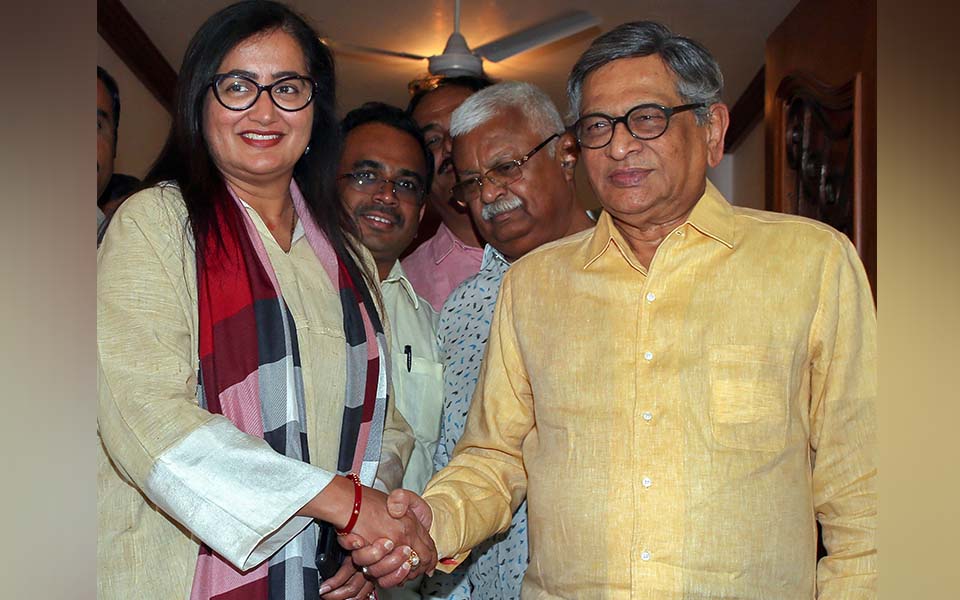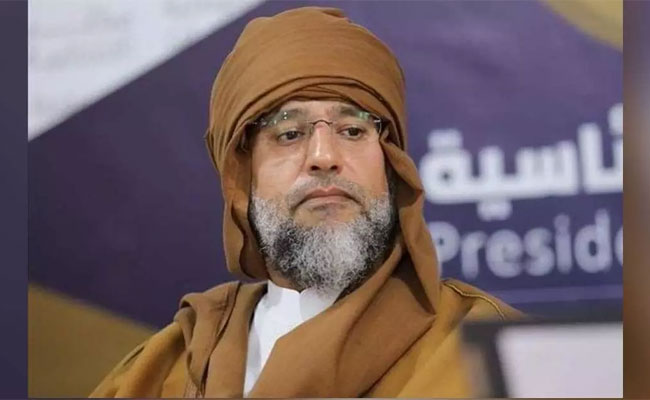Bengaluru, Mar 15: Sumalatha Ambareesh, wife of late actor-turned-politician, who is likely to contest as an independent from Mandya in the Lok Sabha polls, Friday met senior BJP leader and former Karnataka Chief Minister S M Krishna here and sought his support.
Krishna, a prominent Vokkaliga leader from Mandya Said he would discuss with the party leadership on supporting her in the polls.
On her part,Sumalatha said she would reveal her decision on contesting the polls and her plan of action by March 18.
"Sumalatha informed me about contesting the polls from Mandya. I will also speak to the BJP leadership,"Krishna said.
Speaking to reporters, he said the BJP would take a decision by March 18 on whether to field a candidate from Mandya or support Sumalatha by not fielding a candidate.
Conceding that there is a demand within the BJP to field a candidate from Mandya, he said "After taking a total view...also looking into the decision that Sumalatha will take on March 18, BJP will take a decision."
On him supporting Sumalatha if the party's decision was otherwise, he said "S M Krishna is not different from BJP as he is part of it."
With Congress ruling out fielding Sumalatha for the Mandya Lok Sabha seat, saying it would go to it's coalition partner JD(S), clamour is growing within the BJP to induct her into the party and field her as the candidate.
A section within the BJP believe that if Sumalatha joins the party and is fielded as a candidate in Mandya, it would help the saffron party, which doesn't have much presence in the Vokkaliga bastion.
Sumalatha's late husband Ambareesh had contested and won from Mandya in the past.
However, according to top BJP sources, instead of inducting her, the party may support her as an independent so that she can continue to bank on the support of disgruntled Congress leaders in Mandya, who are upset about their party's decision to cede the seat to JD(S).
"Her winning is more important now...so support of those disgruntled with the Congress will be an added advantage,which she may lose out by joining the BJP," party sources said.
Speaking to reporters,Sumalatha said she had come to seek the blessings of Krishna, with whom her family shared a good bonding and updated him about the current situation in Mandya.
Stating that she has not met any BJP leaders, the actress said she planned to meet all senior leaders and seek their blessings.
"No one (from BJP) has officially told me that they will extend their support, but in the situation that I'm in, Iwill welcome everyone's support,"she said in response to a question on BJP extending her support as an independent candidate.
Chief Minister H D Kumaraswamy's son Nikhil Kumaraswamy is the coalition candidate from Mandya.
According to the seat sharing arrangement reached by the coalition partners, Mandya has gone to the JD(S).
Let the Truth be known. If you read VB and like VB, please be a VB Supporter and Help us deliver the Truth to one and all.
Ghaziabad (UP) (PTI): Three minor sisters died after allegedly jumping off the balcony of a ninth-floor flat in Ghaziabad early on Wednesday, police said.
Assistant Commissioner of Police (Shalimar Garden) Atul Kumar Singh said the police received information around 2.15 am about three girls jumping off the balcony of the ninth-floor apartment in a tower of Bharat City, located under the Teela Mor police station area.
On reaching the spot, the police found that the girls -- Nishika (16), Prachi (14) and Pakhi (12) -- daughters of Chetan Kumar, had fallen to the ground floor and suffered fatal injuries, the ACP said.
They were rushed by ambulance to a hospital in Loni, where doctors declared them dead on arrival, he added.
The police have initiated legal formalities and are investigating the circumstances leading to the incident, officials said.





